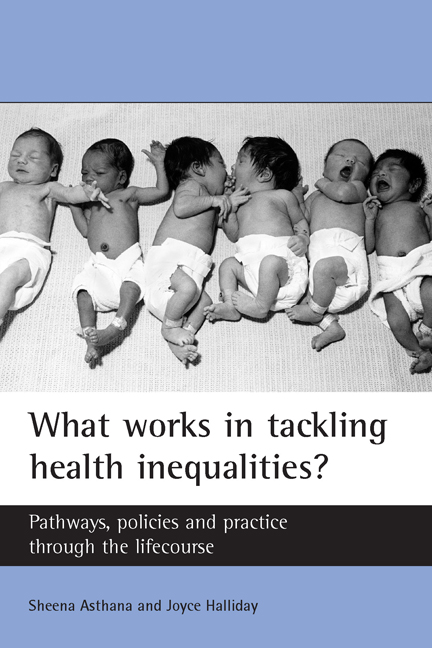Book contents
- Frontmatter
- Dedication
- Contents
- List of tables, boxes and figure
- Acknowledgements
- List of abbreviations
- one Introduction
- Part 1 The research and policy context of health inequalities
- Part 2 Health inequalities pathways, policies and practice through the lifecourse
- Part 3 Tackling health inequalities: developing an evidence base for public health
- Index
four - Early life and health inequalities: research evidence
Published online by Cambridge University Press: 14 January 2022
- Frontmatter
- Dedication
- Contents
- List of tables, boxes and figure
- Acknowledgements
- List of abbreviations
- one Introduction
- Part 1 The research and policy context of health inequalities
- Part 2 Health inequalities pathways, policies and practice through the lifecourse
- Part 3 Tackling health inequalities: developing an evidence base for public health
- Index
Summary
Introduction
As discussed in Chapter Two, early life has become a key focus for both research and policy relating to health inequalities, in part because of the recognition that several risk factors for disease that manifest in later life begin during this earlier stage of the lifecourse. The importance attached to improving health in the early years also reflects the fact that, despite the positive impact of recent changes to the tax and benefit system, rates of child poverty in Britain remain high. Using a poverty line of 60% of median income, an estimated 25% of British children were living in poverty in 2003/04 after housing costs are accounted for (Piachaud and Sutherland, 2002). Thus, it is important to target factors that are associated with poverty and deprivation and that are known to present risks to healthy development.
The strong focus on children may also reflect a perception that there is greater practical scope to design and implement child health interventions than to tackle the processes by which social disadvantage impacts on adult health. At least some of the factors that are known to adversely affect child development appear to lend themselves to medical, behavioural and educational interventions that, compared with the policy implications of tackling problems such as low income, unemployment and poor housing, seem ‘contained’. Children's capacity to develop cognitive skills, effective coping strategies and improved self-esteem are believed to be more adaptable than that of adults (Wadsworth, 1999). Insofar as young children and their mothers are already major users of health and other community services, they represent a relatively ‘captive’ population for certain intervention programmes (although issues of access and non-attendance must be considered). The existing base of community services also provides a springboard from which to launch child development initiatives that may not carry the stigma of new programmes that are specifically targeted at ‘excluded’ groups.
In assessing the significance of early life experiences to health inequalities, a distinction has been made between latent, pathway and cumulative effects (see Chapter Two). This distinction is important because it has implications for the choice of when and how to intervene to reduce health inequalities (Evans, 2002, p 53).
- Type
- Chapter
- Information
- What Works in Tackling Health Inequalities?Pathways, Policies and Practice through the Lifecourse, pp. 111 - 152Publisher: Bristol University PressPrint publication year: 2006



